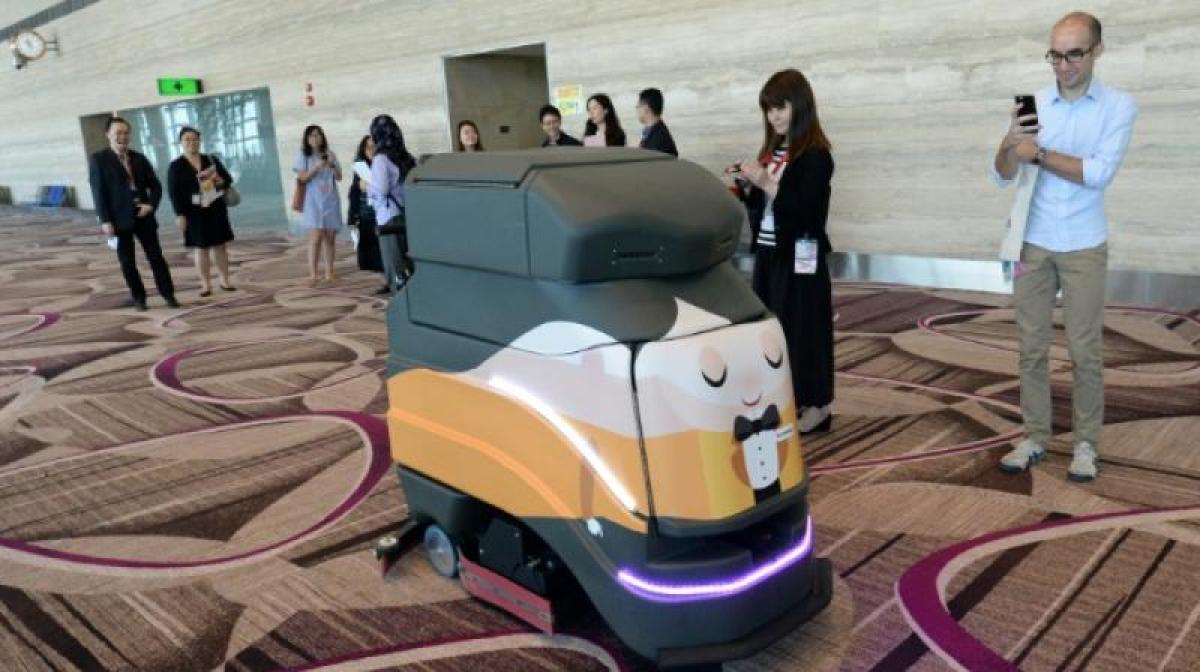Live
- GMR Airports Unveils AI-Powered Digital Twin Platform to Transform Airport Operations
- India poised to become leading maritime player: PM Modi
- Top Causes of Kidney Stones and How to Recognize Silent Symptoms
- India’s renewable energy capacity logs 14.2 pc growth at 213.7 GW
- Winter Session of Odisha Assembly adjourned sine die
- Biden calls Trump's tariff approach 'major mistake'
- After Drama Over Eknath Shinde’s Chief Minister Race, Maharashtra Cabinet Formation Faces New Tensions
- Egyptian FM, Blinken discuss recent developments in Syria
- Iran's supreme leader says Syria's developments result of US-Israeli 'plot'
- Elon Musk to Purchase $100 Million Luxury Mansion Next to Donald Trump's Mar-a-Lago, Report Reveals
Just In

\"It\'s really challenging for airports to launch this digital transformation,\" he told AFP.
Passengers' baggage is collected by robots, they relax in a luxurious waiting area complete with an indoor garden before getting a face scan and swiftly passing through security and immigration -- this could be the airport of the future.
It's a vision that planners hope will become reality as new technology is rolled out, transforming the exhausting experience of getting stuck in lengthy queues in ageing, overcrowded terminals into something far more pleasant.
The Asia-Pacific has been leading the way but faces fierce competition from the Middle East as major hubs compete to attract the growing number of long-haul travellers who can choose how to route their journey.
The regions "are the two leading pockets of technology growth because they are really competing to be the global hubs for air transportation," Seth Young, director of the Center for Aviation Studies at Ohio State University, told AFP.
"If I'm going to fly from New York to Bangalore, do I transfer through Abu Dhabi or Dubai or do I transfer through Hong Kong? That's a huge, huge market."
But the changes also represent major challenges that could upend decades-old business models at major airports, with analysts warning operators may face a hit to their revenues to the tune of billions of dollars.
Passengers' baggage is collected by robots, they relax in a luxurious waiting area complete with an indoor garden before getting a face scan and swiftly passing through security and immigration -- this could be the airport of the future.It's a vision that planners hope will become reality as new technology is rolled out, transforming the exhausting experience of getting stuck in lengthy queues in ageing, overcrowded terminals into something far more pleasant.
The Asia-Pacific has been leading the way but faces fierce competition from the Middle East as major hubs compete to attract the growing number of long-haul travellers who can choose how to route their journey.
The regions "are the two leading pockets of technology growth because they are really competing to be the global hubs for air transportation," Seth Young, director of the Center for Aviation Studies at Ohio State University, told AFP.
"If I'm going to fly from New York to Bangalore, do I transfer through Abu Dhabi or Dubai or do I transfer through Hong Kong? That's a huge, huge market."
But the changes also represent major challenges that could upend decades-old business models at major airports, with analysts warning operators may face a hit to their revenues to the tune of billions of dollars.
Airports are also trying to overhaul their image as dreary places that must be endured in order to get from A to B, to somewhere travellers can enjoy spending time.
Changi is building a new terminal complex called Jewel, a 10-storey development filled with shops and restaurants whose centrepiece will be a 40-metre (130-foot) indoor waterfall surrounded by an indoor garden.
The complex will make the airport look more like a shopping mall than a traditional hub, and is aimed at cashing in on transitting passengers.
"They are looking at retail, non-aeronautical profits," said Shukor Yusof, an aviation analyst from Endau Analytics.
But while hubs in Asia-Pacific and the Middle East surge ahead, airports in the United States and Europe are being left behind.
"Europe and the US were the leading aviation markets for the last 75 to 100 years, and it's very difficult to revolutionise your infrastructure when you are on a foundation that is 75 years old," said Young of the Center for Aviation Studies.
He added it was also a matter of "political will", as emerging economies see building cutting-edge airports as a way of raising their status globally.
Ageing hubs
Some US and European airports are nevertheless trying to up their game.
New York's ageing airports have long been criticised as old-fashioned, cramped and dirty but JFK, the main international hub serving the city, hopes to shed its dire reputation with a proposed $10 billion redevelopment.
Amsterdam's Schiphol is aiming to become the world's leading digital airport by 2019, and has been testing hand luggage scanners that allow passengers to keep liquids and laptops in their bags. It is also looking at biometric technology.
Despite the buzz surrounding new technology, there are concerns that rapid innovation could threaten long-held ways of doing business.
A report from consultancy Roland Berger warned that airport revenues from retail and parking could fall by between two and four billion dollars due to the new innovations.
Automated, more predictable check-in procedures threaten retail outlets as passengers are likely to reduce the "buffer" they build in to trips to the airport, meaning less shopping time, while developments such as ride-hailing apps could undercut parking revenues, it said.
Still, the landscape may not transform so quickly as many airports face difficulties in introducing new technology, from resistance to change to availability of financing, said Xavier Aymonod, a transport expert at Roland Berger and lead author of the report.
"It's really challenging for airports to launch this digital transformation," he told AFP.

© 2024 Hyderabad Media House Limited/The Hans India. All rights reserved. Powered by hocalwire.com







